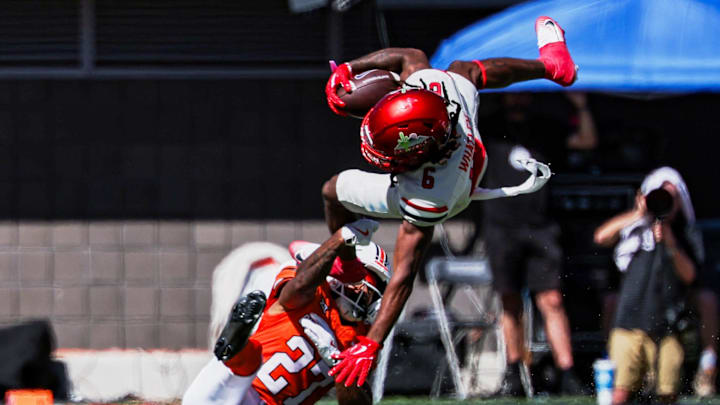Arizona entered October with the 28th-ranked run defense nationally, allowing 99.75 rushing yards per game. The Wildcats are now 60th nationally, allowing 139.71 rushing yards per game. Arizona allowed 488 rushing yards in its first five games and 490 in the last two contests.
In losses to BYU and Houston in the last two weeks, each of the Cougars supplemented their primary ball carriers with quarterbacks who nearly ran for 100 yards. Bear Bachmeier had 22 carries for 89 yards and a TD for BYU. Connor Weigman had 14 carries for 98 yards and a TD.
BYU ran 51 times for 258 yards and three TDs against Arizona. Houston ran 45 times for 232 yards and one score versus Arizona. L.J. Martin led BYU with 25 carries for 162 yards and one TD against Arizona. Dean Connors had 20 carries for 100 yards to lead Houston and added three receptions for 38 yards versus Arizona.
Weber State had the previous high against Arizona in 2025 with 31 carries for 116 yards in a 48-3 loss on September 6. The 47 rushing attempts and five TDs on the ground by Iowa State were the most against Arizona in 2025. Iowa State ran for only 111 yards and a season low 2.36 yards per carry verus Arizona.
Arizona’s run defense had been stingy this season prior to the BYU game.
— Ben Criddle (@CriddleBenjamin) October 13, 2025
Hawaii - 67
Weber St -116
K-State - 105
Iowa St - 111
Okla St - 89
BYU - 258 pic.twitter.com/uAcstBlIR8
Kansas State ran 24 times for 105 yards and 4.38 YPC, which was the highest allowed by Arizona until each of the past two weeks. Arizona head coach Brent Brennan discussed the issues with their run defense in the last two games in his postgame comments after the loss to Houston.
BYU and Houston committed to the run against Arizona. BYU ran 51 times and had 29 pass attempts in its 33-27 double overtime win over Arizona. Houston ran 45 times and had 23 pass attempts in its 31-28 win over Arizona. Arizona has to improve its run defense significantly over the next five games or they will continually be pounded on the ground.
